Cryptocoryne Fischer ex Wydler
crypt
Araceae
Barclaya, Aponogeton, Aridarum, Bucephalandra, Jasarum, Lagenandra, Ooia, Piptospatha
southeastern Asia, from India to Papua New Guinea
Numerous species, although many rarely cultivated if they are threatened in the wild, rarely encountered, or difficult to maintain.
Cryptocoryne affinis N.E.Br.
C. albida R. Parker [also offered under the synonym C. costata Gagnep.]
Cryptocoryne amicorum de Wit & N.Jacobsen [synonym of C. minima Ridl.]
C. aponogetifolia Merr.
C. blassii de Wit [unresolved]
C. beckettii Thuill. ex Trim. [also offered under the synonym C. petchii Alston]
C. bullosa Becc.
C. ciliata (Roxb.) Fisch. ex Wydler
C. cordata Griff. [also offered under the synonym C. siamensis Gagnep.]
C. crispatula var. balansae (Gagnep.) N. Jacobsen [also offered under the synonym C. balansae Gagnep.]
C. fusca de Wit
C. hudoroi Bogner & N.Jacobsen
C. ideii Budianto
C. lingua Becc. ex Engl.
C. moehlmannii de Wit
C. nevelii Trimen
C. noritoi Wongso
C. nurii Furtado
C. parva de Wit
C. pontederiifolia Schott
C. x purpurea Ridl.
C. pygmaea Merr.
C. retrospiralis (Roxb.) Kunth
C. spiralis (Retz.) Fisch. ex Wydler
C. striolata Engl.
C. tonkinensis Gagnep. [synonym of C. crispatula var. tonkinensis (Gagnep.) N. Jacobsen]
C. undulata Wendt
C. usteriana Engl.
C. walkeri Schott [also offered under the synonyms C. legroi de Wit and C. lutea Alston]
C. wendtii de Wit
C. x willisii Reitz [also offered under the synonym C. x lucens de Wit]
Cryptocoryne beckettii is recorded as established in the San Marcos River (Texas), C. wendtii is recorded as established in Rainbow Springs in Florida, and C. walkeri Schott is introduced in Florida (all United States).
not weedy
creeping, rhizomatousrhizomatous:
(adj) possessing rhizomes
, amphibiousamphibious:
(adj) of a plant able to live on land or in water
rosetterosette:
(n) a radiating cluster of leaves, usually close to the ground at the base of a plant
 plant
plant
Perennial. Creeping, rhizomatousrhizomatous:
(adj) possessing rhizomes
, often developing smaller plantlets from laterallateral:
(adj) on or pertaining to the side of an organ or structure
rhizomes. Leaves in a rosetterosette:
(n) a radiating cluster of leaves, usually close to the ground at the base of a plant
 , distinctly heterophyllousheterophyllous:
, distinctly heterophyllousheterophyllous:
(adj) with dissimilar leaves on the same plant; often occurs on plants with both submersed and emersed leaves
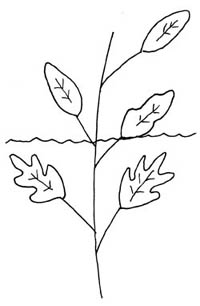 between emersedemersed:
between emersedemersed:
see emergent
and submersedsubmersed:
see submerged
growth forms; leaf bladeblade:
(n) (syn. lamina) the flat, expanded part of a leaf, frond, or petal (excluding, e.g., the petiole)
 convoluteconvolute:
convoluteconvolute:
(adj) rolled up or rolled together longitudinally, as leaves or petals in bud
in budbud:
(n) an embryonic meristem (dividing cell-mass) enclosed in small, protective scales, that develops into a flower, leaf or another stem
(cf. Lagenandra), linear to cordatecordate:
(adj) heart-shaped; in the form of two rounded lobes
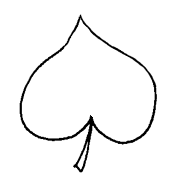 but highly variable in shape, size and coloration, sometimes bullatebullate:
but highly variable in shape, size and coloration, sometimes bullatebullate:
(adj) having a pimpled or blistered surface
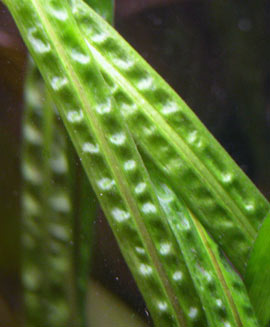 or undulateundulate:
or undulateundulate:
(adj) (of, e.g., a margin) with a wavy surface; wavy in the vertical (up and down) plane
; marginmargin:
(n) edge; rim
entire. Inflorescenceinflorescence:
(n) the arrangement of flowers on the floral axis
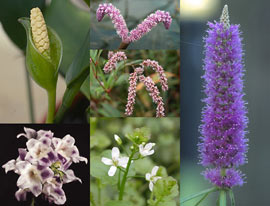 a very short spadixspadix:
a very short spadixspadix:
(n) a spike of small flowers borne on a thick, fleshy axis
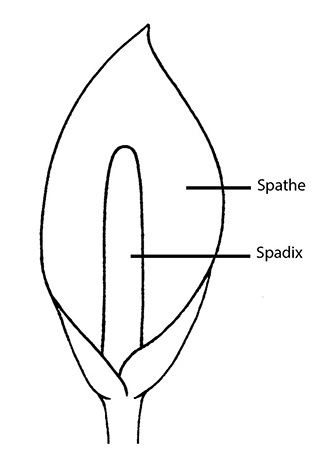 , enclosed in the dilated base (kettle) of the tubulartubular:
, enclosed in the dilated base (kettle) of the tubulartubular:
(adj) (of a corolla, perianth, calyx tube or other structure) (1) tube-shaped; cylindrical: narrow and elongate with more or less straight sides; (2) having segments fused into a tube (of any shape)
spathespathe:
(n) a large bract or bracts subtending and often enclosing an inflorescence
 ; limblimb:
; limblimb:
(n) the expanded portion of a petal or bract (e.g., a spathe)
of spathespathe:
(n) a large bract or bracts subtending and often enclosing an inflorescence
 ovate to elongate, occasionally twisted.
ovate to elongate, occasionally twisted.
found in a variety of tropical riverine or swamp habitats, adapted to fluctuating water levels during seasonal flooding and drought
A genus of 60 species, but only about a dozen species commonly traded in the industry. Typically delicate, slow growing plants that may spontaneously rot when conditions change suddenly. Cultivated either submersedsubmersed:
see submerged
or emersedemersed:
see emergent
. Frequently tissue cultured. High degree of polyploidy between some species, combined with a high degree of phenotypic variation, has made the taxonomy of this genus problematic. Accurate identification of most species can only be confirmed by examining flowers. A high level of localized endemism has made some species endangered in their native range due to human development and over-collecting for the aquarium trade.